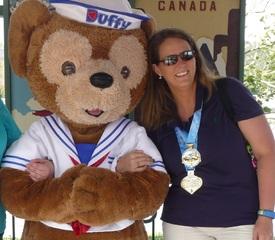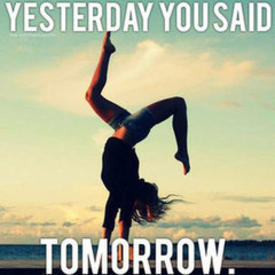1/2 Marathon tips needed please

JennS19
Posts: 642 Member
I have decided to starting Training for a 1/2 marathon that is in April.
I found a training schedule that I have started to follow but I didn't know if any of you running experts had some tips of the trade you could share.
This will be my first 1/2 and I'm scared beyond belief!!!! LOL
Thanks so much!
I found a training schedule that I have started to follow but I didn't know if any of you running experts had some tips of the trade you could share.
This will be my first 1/2 and I'm scared beyond belief!!!! LOL
Thanks so much!
0
Replies
-
how much are you running now?0
-
YAY!! I'm doing my first 1/2 in July next year, too!
Do you have a running buddy? My sister and her friend are running with me. Even with our different locations, we'll be using Endomondo to help track our training progress. Might be something you'll want to look into.
If anything, you'll have me!
Good luck!0 -
Good Running shoes are key. Go have yourself fitted if you haven't done so already.
Listen to your body, you will have good running days and bad, don't get discouraged on a bad day.
Enjoy the experience. It's such a WONDERFUL feeling of accomplishment once you cross that finish line!0 -
I'm doing my first half marathon in March! I just finished doing a 10k last weekend, and although I thought I was gonna die, it was the greatest feeling ever to finish! So I am definitely looking forward to the next one!0
-
Once you get up past 6 miles in training, you're going to want to start figuring out what fuels and hydration work for you. I found that a larabar lasts me 13 miles. I use a camelback hydration pack (70 oz bladder), and put nuun electrolyte tablets in it (tropical and fruit punch are my fave flavors). It's also nice cuz I can carry a very well stocked first aid kit! The drawback is that you're lugging an extra 8 lbs on your back and might have some sore traps/shoulders for a day or so.
I did 2 half marathons this summer in vibrams while pregnant. You can totally do it! The longest race I had completed prior to training was 6k. I did a 10k race during training, and we alternated long runs and short runs every weekend. During the week we kept to going as far as we could within a specific time limit 3 days a week. I did the Jeff Galloway run-walk-run program. Your legs stay fresher longer because you're constantly switching muscle groups.0 -
Figure out where you want to be in April, and work your way back from there.
I second running shoes.
I've done two half marathons, mostly walking, and I recommend just following the training guide, getting as many people involved as you can, and just be proud of the fact that you will be finishing ahead of every single person who stayed at home on the couch.
I think the most important thing to remember is that (unless you're secretly some elite Kenyan) the only person you're really competing against is yourself.0 -
I've done several halfs and the best tip I can give you is find a good training plan and stick to it. Don't deviate - trust the plan. I recommend Hal Higdon's plans. I'm using his marathon training plan now for the Dallas Marathon in December, but there are many good training plans out there that will do the job. Whenever I've done a long distance like a half and followed a training plan, I've PR'd. When I've winged it or made too many modifications to the plan, I have not done as well.
Also, never try anything new on race day. Test out your socks, shoes, sports bra, clothes, headband, etc. as well as your fuel for during the race all throughout your training. When you find something that works for you, stick to it and don't modify it on race day. Once, the night before a marathon, a girlfriend got me new socks as a good luck gift and I wore them during the race and got horrible blisters cause they slipped down on my heel, they were a touch too small. Never wear or eat anything new, that's what training is for - to test everything out so you are comfortable and confident on race day.
GOOD LUCK!!! :happy:0 -
I've only run a 5k so far. So I have a long way to go.
 0
0 -
I've only run a 5k so far. So I have a long way to go.

Awesome. I would really recommend getting fitted for proper running shoes.. from a running store. I echo the sentiment from the others that have posted already too. Lock down a training plan and stick to it, regardless. I use some of the built in training that is offered through Runkeeper.
I started with a 5k, an 8k after, and have been working on just running and training more. Best of luck and happy trails!0 -
Other than shoes.........
Find a training plan that suits your fitness level. Check out Hal Higdon's plans, his Novice 1 half marathon plan starts at a pretty gentle volume. It's a 12 week plan but starting sooner rather than later will give you the luxury of doubling up weeks which, IMO, is a great way to build a solid aerobic base and progress at a conservative pace.
One of the keys to success (in many aspect of life, not just running) is consistency, get out running 3 or 4 times each week without fail. Be patient, most running injuries come from doing too much, too soon, too fast.
If you get a chance, try to sign up for a 10K race between now and race day just to give you a taste of a longer race.
Most importantly, learn to control your pace. Slow and steady may not get you to the podium but it will get you across the finish line with a smile on your face.0 -
Everyone has wonderful advise.
I can only add, find what works for you and go for it.
Have fun and good luck!0 -
Lots of good advice above.
Let me add: don't overdo it. Make sure that if your plan calls for a day off from running, that you actually don't run (or lift or bike or ski) that day. Your body needs a day or two each week to recover from the training that you do. Sometimes that takes as much discipline as the training itself.0 -
Don't go into with a specific time that you want to finish. This will give you added stress and anxiety. Follow the plan, but try different running routes with varies hills, etc. I often got bored with the same scenery.
I have now done two 1/2 and was totally scared for the first one and I completed it with an injury. It can be done and I had only ran a 5K prior to that as well.
Let the pace be with you.0 -
I recently completed a half as training for the full (net spring). I found a training plan and stuck to it like glue with my training partner. Our longest training run was 12 miles, which is not unusually long for a beginner half marathon plan. Sticking to the plan, especially one that takes up up 12 miles, you realize that if you can run 10, 11, 12 miles, you can totally do 13.1. Sticking to a training program will also give you an estimate of a very organic feeling finish time - not saying you should push for a time, but you should know how long it will take you.
The only other tips I can think to give that I haven't seen here:
1. Don't stress if you break a rule of thumb or expert advice. So if you don't get great sleep the night before, or if you eat something new for the first time on race day, or if you have to wear new socks day of - don't sweat it. Be smart (don't eat something you know you're allergic to the night before, don't intentionally stay up all night drinking, etc), but don't be stressed. Stuff happens when you party naked. Roll with it.
2. If you can, at least drive the course before race day. We had planned on our long run being the course, but due to logistics we ran locally instead. This meant we were totally unprepared for the "gentle slope between miles 5 and 7" - gentle like a cliff. Had we driven it, we would have been a little better prepared mentally, and might have tried to work in more downhills on our training runs. That being said, we still finished it ahead of what we were expecting. I think we could have finished faster had we known the course better. Ideal is training on the actual course regularly.
3. The "taper" in your training plan may make you cranky (thanks to MFP community for helping me recognize that is perfectly normal!). My training partner loved the taper as a lovely break from hard training. I wanted to kill everybody, all the time, then go sprint a marathon. Knowing how I react to the taper now, I'm training up on my bike so that I can cross train to vent off some of that "taper rage" for future races. Having an enjoyable cross training sport (avoid anything with side-to-side motions like basket ball) can help tremendously.
4. Plan your recovery, then be flexible. During my taper rage, I wanted to sign up for all these other races the following weekends (actually doing a 15 mile race this weekend as a result, kinda regretting that but we'll see how it goes). Luckily my training partner and husband came to my rescue and got me to take a proper rest for at least a week or so. I did have my shoes on the next day, but didn't push again for a week or so. My training partner took most of a week off, then came back to slow and steady. One rule of thumb (which you can break if your body tells you otherwise) is a day for every mile. If I'd not run for 13 days, I think I would have actually killed someone - but I didn't run hard or push hard. Again, cross training helps.
5. Have fun.
6. Run some more.0 -
Ejwme: What's a "taper" I don't remember seeing anything that said this in my training schedule.
Thank you all for the awesome advice!! I'm getting mroe and more excited just reading what you have all said.
I'm getting mroe and more excited just reading what you have all said.
I guess I never thought about having to fuel my body during the race other than water but it makes sense. Do you right eat before the race or during? I so need to read more on 1/2s. I have so much to learn.
I do need a new pair of shoes. BADLY!! I'm hoping to get a nice new pair in the next few weeks and I will definitley get fitted the correct way.
I run a lot inside on my treadmill now. Do you reccomend always running inside? I live in Michigan and right now it's COLD and sometimes windy. Woudl it be ok to train mostly inside until March and then starting to run outside? or would that completely ruin things for me?0 -
Treadmill is a bit easier on your body than outside... so that's something to keep in mind. You can do outdoors even in the cold provided you dress appropriately (layers, wicking fabric,etc.)............ but on the other hand, doing some training indoors then switching to outside is also a viable way to go.. gotta do what works for you!
And tapering... thats where you gradually cut back on your mileage before the race... to give your body time to build up its glycogen stores, get your muscles all rested and raring to go come race day.0 -
I've done several halfs. I do a lot of my training on the treadmill, but I do suggest trying at least one run each week outside. That said, be smart about it....a broken ankle from falling on ice will definitely derail your plans. The big thing, other than shoes, is to go in without a time goal. It's your first half---a guaranteed PR. Relax and enjoy the run. Oh, and I also suggest practicing "pit stops" on your longer runs, either at your own house, a friend's, or a portapotty. Practicing with sweaty clothes will help. I have some chafing horror stories I could tell....0
-
Jen,
Kudos to you for signing up and getting amped to do a half marathon! Its a wonderful goal and you'll feel amazing when you achieve it. I, too, live in Michigan and run year round (regardless of weather) out of doors. I highly suggest popping off the treadmill and stepping outside for your runs. It will help you be prepared for race day conditions and also make it easier to incorporate inclines (I'm talking hills) into your training schedule. Hills are a great way to increase your running pace without having to do sprints or pace runs. And not to repeat everyone else's advice but following a training schedule, listening to your body and a proper running kit (most importantly shoes and non chaffing clothing) will help you reach your goal. Also if you do find that you have some chaffing spots on your body, there are many types of "body glide" gels/lotions/sticks that will reduce if not eliminate the chaffing areas and diaper cream will help the chaffing heal quickly.
You can do it!0 -
Thank youi pixie mom for explaining. I did see in my training schedule the cut back in miles before the race. Thanks!0
-
sorry, yeah, I forgot I had to learn about tapering too! for the half, it's often the week or two before the race, you'll see a steady dip in miles. Apparently replenishing a glycogen store makes me homicidal - I hope you have an easier time of it! Over the whole training schedule you may notice high miles one weekend, then lower miles the next, then even higher the next... that's building your mental game (different from tapering). That way, even if your longest run to date was horrible, you know you have a reprieve the next weekend. It's more common in full marathon training programs, but my half did it too.
And another thing I learned and forgot - there's a cutoff point, at least for me, where cotton won't do. In the summer, it's around 8 miles or so (for me). I never discovered it in the winter, so depending on your distances and training, you might discover it or not. It's that point at which cotton WILL chafe no matter what, and body glide, vaseline, AND technical fabrics (polyester, spandex, nylon, wool) or something else is a must.
When you discover that chafing point, blister specific bandages are your best friend.
You can do this!0 -
I too am training for my first half; I've only ever done 2 5Ks and they were Warrior Dash, so not an easy race by any means. I've run as much as 8 miles and once 9 miles. I was regularly running 3x per week; shorter runs during the week and longer run on the weekend.
I am using the Hal Higdon novice1 training schedule and I've not actually signed up for a half yet. But I've identified a 5K that fits perfectly into the schedule to sign up for (Reindeer Romp....haha sounds fun).
I too need to read a little more on training for half's; I already have good shoes and was fitted at a running store after they evaluated my gait. I have some regular running clothes, but need to add to them; I don't have enough cold weather running clothes.
My only issue for training is where we live is all hills...so unless I'm running on the treadmill...I'm doing hills every run. We do have the option of driving 1 hour to a greenway to do a more level run but we don't do this but maybe once per month if that. Any recommendations for me on this?0 -
I'll be doing my fifth Half next month. I generally do the walk/run for it and followed Jeff Galloway's training plans. I have modified it over the years and plan my entire year's mileage schedule in advance. Do what is on your plan and don't skip! Also agree with not doing anything different on race day. Adding that if your race is early, early in the morning or at night, make sure one of your last long training runs is at the same time of day.
The treadmill is all right, but you definitely need to put foot to pavement so your body knows how to deal with the harder surface. My long day is always outside unless it is raining, but I live in FL so it doesn't get cold enough to keep me inside.
Check out the course if you can. See if it is hilly or flat to help you prepare.
Most importantly...have fun!!! There is no better feeling than crossing the finish line!0 -
I do like the tip of trying to run outside at least once a week to get the feel of it. I've done a few 5ks outside and 2 of them were in the cold. I have one more that I'm doing on Thanksgiving day.
Thanks for all the advice! I've downladed the Endomondo app and I'm having my friends do the same so we can track each other's training. Great idea!0 -
I have a question on recovering after a 1/2. Do I not run for a few days after? I know after some 5ks I'm sore because of the course and a run a day or 2 after helps my muscles.
Any advice? Thanks!0 -
Find a buddy to train with! It makes the runs so much more fun!
Also, think about when you want to start fueling. I find anything above 10 miles is tough to do without a bit of fuel.
Be ready to have good runs and bad runs when you're training too. Some days you feel like a million $, but some runs are torture the whole time. It's good for building mental strength and determination though :-)0 -
I have a question on recovering after a 1/2. Do I not run for a few days after? I know after some 5ks I'm sore because of the course and a run a day or 2 after helps my muscles.
Any advice? Thanks!
I'd say leave it as an option, but listen to your body. If your body says to keep resting, take it off. If running feels right, do that. I wouldn't plan on doing hard-core intervals the next day or even the day after. Likely your body will tell you precisely what you should do, if you pay close enough attention. And everybody's different - there's no shame in taking cues from your own body and doing your own thing.0 -
While training make sure to run inside and out. There is such a difference and it will help you so much for your body to be conditioned for both.0
-
Good Running shoes are key. Go have yourself fitted if you haven't done so already.
Listen to your body, you will have good running days and bad, don't get discouraged on a bad day.
Enjoy the experience. It's such a WONDERFUL feeling of accomplishment once you cross that finish line!
THIS!!
And dont worry if you dont run that longest training length before the race, you CAN do it. I did my firt one this past june and didnt run more than 6 miles before the race!!
( I do not recommend this, however LOL )
Good LUCK!!!0 -
Bump!!! I am going to ned this!!! great topic!!0
-
Some great advice here! I just signed up for my first Half in April too. I have power walked a couple of full Marathons, but this will be my first Half and the first one running.
Seconded/ thirded on the running shoes thing, I got fitted properly for a new pair a couple of months ago and it really does make a difference.0
This discussion has been closed.
Categories
- All Categories
- 1.4M Health, Wellness and Goals
- 398.1K Introduce Yourself
- 44.7K Getting Started
- 261K Health and Weight Loss
- 176.4K Food and Nutrition
- 47.7K Recipes
- 233K Fitness and Exercise
- 462 Sleep, Mindfulness and Overall Wellness
- 6.5K Goal: Maintaining Weight
- 8.7K Goal: Gaining Weight and Body Building
- 153.5K Motivation and Support
- 8.4K Challenges
- 1.4K Debate Club
- 96.5K Chit-Chat
- 2.6K Fun and Games
- 4.8K MyFitnessPal Information
- 18 News and Announcements
- 21 MyFitnessPal Academy
- 1.5K Feature Suggestions and Ideas
- 3.2K MyFitnessPal Tech Support Questions





















